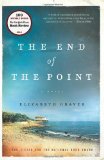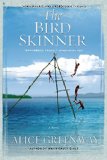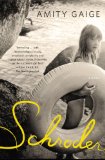Summary | Excerpt | Reading Guide | Reviews | Beyond the book | Read-Alikes | Genres & Themes | Author Bio

A precisely observed, superbly crafted novel, The End of the Point by Elizabeth Graver charts the dramatic changes in the lives of three generations of one remarkable family, and the summer place that both shelters and isolates them.
A place out of time, Ashaunt Point - a tiny finger of land jutting into Buzzards Bay, Massachusetts - has provided sanctuary and anchored life for generations of the Porter family, who summer along its remote, rocky shore. But in 1942, the U.S. Army arrives on the Point, bringing havoc and change. That summer, the two older Porter girls - teenagers Helen and Dossie - run wild. The children's Scottish nurse, Bea, falls in love. And youngest daughter Janie is entangled in an incident that cuts the season short and haunts the family for years to come.
As the decades pass, Helen and then her son Charlie return to the Point, seeking refuge from the chaos of rapidly changing times. But Ashaunt is not entirely removed from events unfolding beyond its borders. Neither Charlie nor his mother can escape the long shadow of history - Vietnam, the bitterly disputed real estate development of the Point, economic misfortune, illness, and tragedy.
An unforgettable portrait of one family's journey through the second half of the twentieth century, The End of the Point artfully probes the hairline fractures hidden beneath the surface of our lives and traces the fragile and enduring bonds that connect us. With subtlety and grace, Elizabeth Graver illuminates the powerful legacy of family and place, exploring what we are born into, what we pass down, preserve, cast off or willingly set free.
The End of the Point is poetic and profound. Again and again, Graver's characters either articulate or exemplify the idea that, whether they understand why or how, it's only at Ashaunt Point that they are truly themselves at their most authentic, largely removed from the dramas that might characterize the rest of their lives. Readers will likely come away from Graver's novel reflecting on the special places in their own lives, longing to reconnect with or revisit them, to introduce their meaning and beauty to new generations...continued
Full Review
(739 words)
This review is available to non-members for a limited time. For full access,
become a member today.
(Reviewed by Norah Piehl).
 Elizabeth Graver's novel is set on a (fictional) point jutting out into Buzzards Bay, which borders Massachusetts and is tucked in between the southwest coast of Cape Cod, Plymouth and Bristol Counties on the mainland. New Bedford, which was the world's leading whaling port in the nineteenth century, is the most major city on the bay.
Elizabeth Graver's novel is set on a (fictional) point jutting out into Buzzards Bay, which borders Massachusetts and is tucked in between the southwest coast of Cape Cod, Plymouth and Bristol Counties on the mainland. New Bedford, which was the world's leading whaling port in the nineteenth century, is the most major city on the bay.
Buzzards Bay was, as Graver suggests in her forward, originally occupied by the Wampanoag tribe and was sold to a group of thirty-four Colonial shareholders in 1652 for "30 yards of cloth, 87 moose skins, 15 axes, 15 hoes, 15 breeches, 8 blankets, 2 kettles, one cloak, 2 English Pounds in Wampum, 8 pairs of stockings, 8 pairs of shoes, 1 iron pot, and 10 shillings." The bay was given its name by colonists ...
This "beyond the book" feature is available to non-members for a limited time. Join today for full access.

If you liked The End of the Point, try these:

by Alice Greenway
Published 2014
Written in lush, lyrical prose - rich in island detail, redolent of Maine in summer and of the Pacific -The Bird Skinner is wise and wrenching, an unforgettable masterwork from an extraordinarily skillful novelist.

by Amity Gaige
Published 2013
Attending a New England summer camp, young Eric Schroder - a first-generation East German immigrant - adopts the last name Kennedy to more easily fit in, a fateful white lie that will set him on an improbable and ultimately tragic course.